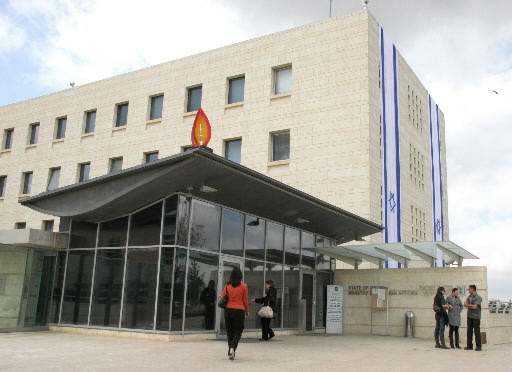Nuclear Weapons Can Be Eliminated: Chapter 10, Part 2
May 14, 2010
Chapter 10: The Middle East, Flash Point of the World
Part 2: Policy of ambiguity
by Keisuke Yoshihara, Staff Writer
Israeli government refrains from confirming nuclear possession
The Foreign Ministry of Israel stands on a hill overlooking Jerusalem. I entered the modern building after undergoing a series of security checks that took about 15 minutes. I asked Andy David, the deputy spokesman, a straightforward question.
Does Israel have nuclear weapons?
Our position is very clear. We will not be the first one to introduce nuclear weapons into the region.
Does that mean Israel does not have nuclear weapons?
Just as I said... I'm afraid that is the position.
Why does Israel take an ambiguous policy toward the nuclear issue?
We believe in peace, but also we believe in self-defense.
Does an ambiguous policy bring peace to Israel?
Unfortunately, we have never had peace with our neighbors from the first day. We are still waiting for that day to come. And we are willing to make many sacrifices for that.
What conditions are needed for Israel to give up its nuclear weapons?
I didn't say that we have nuclear weapons.
Are you aware of the fact that the international community believes Israel has nuclear weapons?
Yes, I'm aware of that.
Avoiding nuclear precautions by its neighbors
The Israeli government has never clearly mentioned that the nation possesses nuclear weapons. It has continued to make the existence or nonexistence of nuclear weapons "ambiguous."
Emily Landau, a senior research associate at the Institute for National Security Studies in Tel Aviv, spoke for the government about its intent. "Israel's policy is designed for its citizens to live with feelings of security," she said. If Israel should declare that the nation possesses nuclear weapons, its neighbors would feel threatened, as if Israel was on alert, and would seek to possess nuclear arms, too. Thus, such logic leads Israel to the conclusion that the best policy is one of ambiguity.
Ms. Landau continued by saying, "From Japan's perspective, the nation which suffered the atomic bombings, it may be hard to accept that possessing nuclear weapons is a positive factor for a country. I can understand that. But for the citizens of Israel, surrounded by many enemies, it is important to believe that the nation is holding nuclear arms."
Some voices call for official announcement of possession
Meanwhile, Dov Khenin, a member of the Israeli Parliament (Knesset), pointed out, "As the government does not make clear whether or not nuclear weapons are being held, an open discussion on the pros and cons of such possession cannot be pursued." In the past, Mr. Khenin tried to propose in parliament that the nuclear facility at Dimona be shut down, but he said that his proposal was not taken up as an agenda item.
Recently, however, subtle changes have emerged. Last fall, in an editorial, the major newspaper Haaretz drew attention to the fact that international momentum for the elimination of nuclear weapons is mounting, and stated: "Israel must look squarely at this trend and be prepared, whether this involves opening the doors of Dimona or officially announcing the amount of nuclear fissile materials held in the country."
(Originally published on April 28, 2010)








